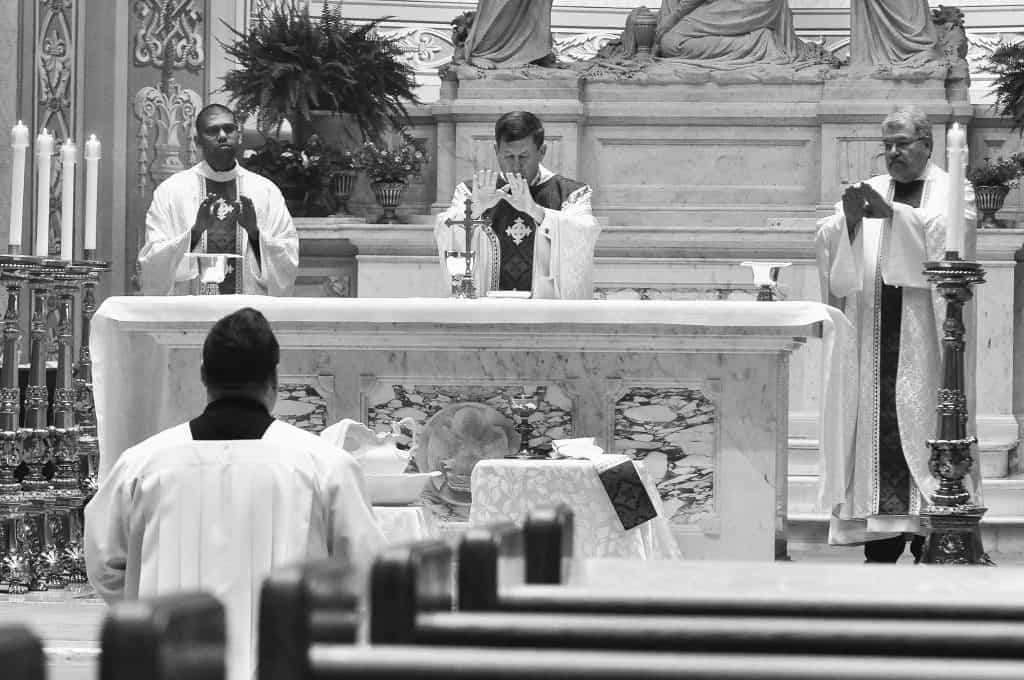
Bishop J. Mark Spalding celebrates the Holy Thursday Mass in a nearly-empty Cathedral of the Incarnation. He celebrated all the Triduum services without a congregation present and each one was recorded and livestreamed from the Cathedral so people could watch from home. Photo by Andy Telli
Bishop J. Mark Spalding described our observance of Holy Week and the celebration of Easter this year as surreal. We couldn’t agree more.
The COVID-19 pandemic left us feeling a bit stranded and alone as large gatherings of people and the public celebration of liturgies were blocked to prevent the spread of the deadly virus. Instead of coming together as a faith community and filling our churches to worship God in the beautiful liturgies of the Paschal Triduum, families had to watch from home as they huddled around their television sets and computer screens.
The Holy Week liturgies themselves, celebrated in empty churches without the community, were stripped down versions. On Holy Thursday, without the faithful present, the Mass did not include the tradition of the priest washing the feet of 12 parishioners in a re-enactment of Jesus’ great gesture of service at the Last Supper when he washed the feet of the Apostles.
Nor did the Mass end, as it typically does, with the removal of the Eucharist from the tabernacle and a final procession around the church before being taken away during the dark times of Good Friday.
The Easter Vigil Mass did not start around a fire with a procession of the faithful carrying candles into the darkened Church, bringing the Light of Christ into the world.
And on Easter, we could not fill our churches for the great prayer of thanksgiving that is the Mass.
Deprived of all these beautiful expressions of our faith, we have had to find new ways to keep Christ close to us, even while we keep our distance from the rest of the world.
In a certain way, it feels a bit unnatural. We are called to proclaim the mercy of the Risen Christ to the world. How can we do that when we feel chained to our couches?
We can do it like we’ve always done it, by bringing our faith into every corner of our lives, even if those corners feel cramped. We must bring our faith into the way we deal with our spouses, with our children, with our parents, with our siblings. It has become even more important to nurture the family as the domestic church, sharing our faith with those closest to us, strengthening it so it can sustain us in a world filled with temptation and often hostile to religious beliefs.
And we can keep using technology to maintain some connection to our community and neighbors. We can call them, text them, Skype them. And we can use technology to keep reaching out to those on the margins, those hit hardest by this pandemic and the shutting down of society to combat it. We can share some of our blessings with food banks and other social service agencies, like Catholic Charities of Tennessee, who are helping those who have lost their jobs because of the pandemic and are struggling to take care of their families.
And we can pray. We have an opportunity to make prayer a routine part of our lives, a routine that will last far beyond this health crisis. We should take advantage of it.
We must remember we’re not ever as alone as we might think. Christ is there walking with us, helping us get through our struggles, lifting us up when we fall. He’s there in this pandemic, comforting the sick, giving strength to those caring for the sick. He’s there at our dinner tables as we rediscover the unique and wonderful connections we form as we share a meal as a family.
Christ is with us. Even in a pandemic, that feels normal.









